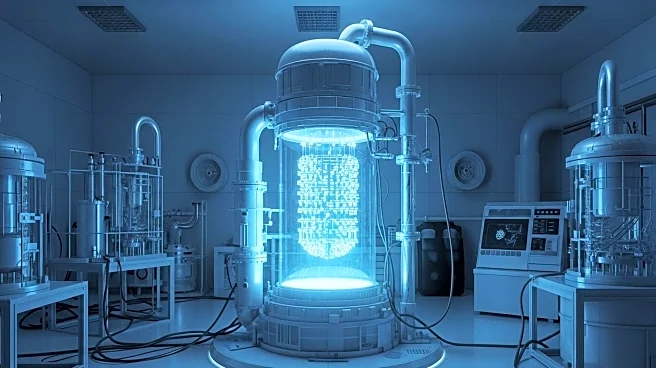What's Happening?
Fujifilm Biotechnologies has inaugurated a $3.2 billion manufacturing facility in Holly Springs, North Carolina. The site, which is part of a phased development, currently features 8 x 20,000-liter mammalian cell culture bioreactors for drug product and substance manufacturing. The facility is set to expand further in 2026, adding finished goods capabilities and doubling its bioreactor capacity. North Carolina Governor Josh Stein highlighted the project's potential to create 1,400 jobs by 2031 and boost the state's economy by $4.7 billion over the next decade. Currently, the facility employs over 680 workers, with plans to increase to 750 by year-end. Fujifilm Biotechnologies CEO Lars Petersen emphasized the importance of the site in meeting the growing demand for medicines driven by an aging global population. The facility also aims for sustainability, offsetting 100% of its carbon emissions from electrical consumption through renewable energy certificates.
Why It's Important?
The opening of Fujifilm's facility is a significant development for the biotechnology industry and the local economy in North Carolina. It represents a substantial investment in the region, promising job creation and economic growth. The facility's focus on expanding drug manufacturing capabilities is crucial in addressing the increasing demand for medical treatments, particularly as chronic diseases become more prevalent. Additionally, Fujifilm's commitment to sustainability through carbon neutrality initiatives aligns with broader industry trends towards environmentally responsible operations. This development not only strengthens Fujifilm's position in the U.S. market but also supports the state's reputation as a hub for biotechnology and pharmaceutical manufacturing.
What's Next?
Fujifilm plans to continue expanding the Holly Springs facility, with the second phase expected to double its bioreactor capacity. This expansion will further enhance the site's ability to produce life-changing medicines. The company is also focused on achieving carbon neutrality by the end of fiscal year 2040, which will involve ongoing investments in renewable energy and sustainable practices. As the facility grows, it is likely to attract additional partnerships and collaborations within the biotechnology sector, potentially leading to further economic and technological advancements in the region.
Beyond the Headlines
The establishment of Fujifilm's facility in North Carolina may have broader implications for the biotechnology industry, including potential shifts in manufacturing practices and increased emphasis on sustainability. The use of modular facility design, which reportedly reduced design time by 70%, could set a precedent for future projects, promoting efficiency and scalability. Additionally, the focus on renewable energy and carbon neutrality reflects a growing trend towards environmentally conscious business operations, which could influence industry standards and regulatory policies.









